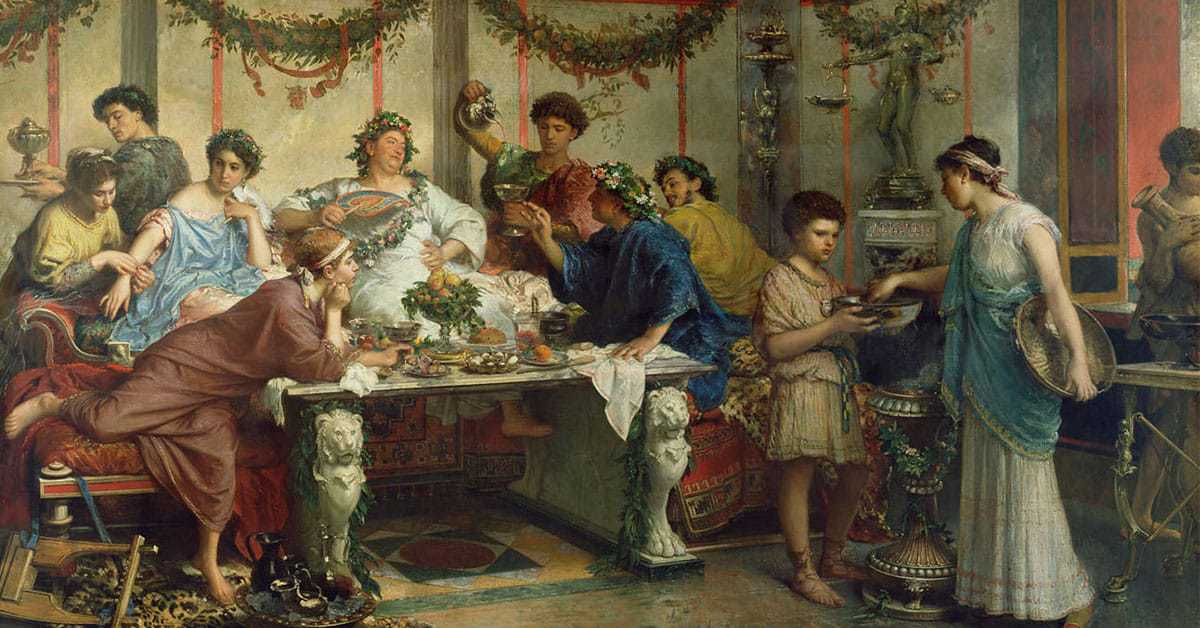Overindulgence is nothing new. Since the practice of wine making first made its appearance in Greece in around 2,000 BC, the consumption (and overconsumption) of alcohol across the Mediterranean and, by means of trade, beyond has been rife. Because booze formed such an integral part of ancient life, we shouldn’t be surprised that we have lots of information about it: both biographical, relating to the consumptive habits of individuals, and moralizing, relating to how people should behave while drinking, and how much is too much.
In the fifth century BC, the Greek Philosopher Zeno made the distinction between a drinker—that is someone who likes to get drunk—and a drunkard—someone who is a slave to their need to drink. The Romans, conservative as they were, preached moderation. They viewed heavy drinking negatively and in connection to a person’s other vices; not only did it count among them but, when under the influence, it also exacerbated them.
Of course, recognizing the difference between drinkers and drunkards is as much of a fine line today as it was two millennia ago, and for this reason, we should be careful in trying to diagnose figures from antiquity as alcoholics. This list, however, deals with eight figures who, judging by the herculean standards of their excess, stumble into the second category.
Alcibiades (c. 450 – 404 BC)
One of the Peloponnesian War’s main protagonists, Alcibiades was also one of the most controversial figures of his time for his weakness for excess and ever-changing loyalties. An Athenian orator and politician, he came to prominence during the Peloponnesian War as the city’s general. When his allies brought charges of sacrilege against him, however, he switched allegiance to Athens’s enemy, Sparta, serving them as a strategist. There too he made enemies, and ended up defecting to the worst enemy of all, Persia until his allies in Athens recalled from exile.

His caprice would ultimately cost him his life. It’s not clear who ultimately ordered his assassination but we do know that his house was surrounded by armed men and that Alcibiades was killed in the struggle. But it arguably wasn’t just his fleeting loyalties that cost him his life; there’s evidence that in terms of his temperament and weakness for wine, Alcibiades was more than capable of alienating people.
One such anecdote comes from Plato’s “Symposia”, a philosophical text about a group of prominent Athenians, including Socrates and Aristophanes, discussing the idea of love. Towards the end of the text, Plato describes how Alcibiades turned up towards the end of the symposium. His entrance is anything but understated. Initially heard shouting from the street outside, he staggers in supported by a flute girl and several of his attendants, demanding to know the whereabouts of Agathon, one of the most handsome men in Athens.
Fresh from a party, wearing a wreath of violet and ivy and with ribbons flowing from his hair, he addresses the shocked guests, asking if they will admit someone already pretty far gone from drinking at their party. They accept, and he’s shown to his place between Agathon and Socrates. Immediately he begins by praising Agathon’s good looks and how Socrates has lost none of his wiliness in sitting himself next to him.
There’s more than a hint of jealousy; in the speech Alcibiades then gives (which, in line with the topic of the symposium is supposed to be about love) he talks mainly about his failed attempts to become Socrates’s lover. He commends the great philosopher’s ability to charm men into submission with his words. But he also praises him in militaristic terms as a great warrior, impervious to hardships, who once saved his life during battle. Finally, he warns Agathon that he should be wary, and that many good-looking young men have tried—and failed—to win the great Socrates over. It might not be the most measured speech that Alcibades gives, but you know what they say: in vino veritas.

